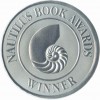Awards and Reviews
Nautilus Book Awards: Silver Winner
The Holy Universe was a Silver Winner in the “Religion: Other” category: http://www.nautilusbookawards.com/2014_SILVER_Winners.html.
The Nautilus Awards represents “Better Books for a Better World.” Founded in 1998, this unique book award program seeks, honors, awards and promotes print books that inspire and connect our lives as individuals, communities and global citizens.
The Nautilus Awards seeks and promotes well-written and -produced books with messages about caring for, understanding, and improving every aspect of our lives and relationships.
We look for exceptional literary contributions to spiritual growth, conscious living, high-level wellness, green values, responsible leadership and positive social change as well as to the worlds of art, creativity and inspirational reading for children, teens and young adults.
.
USA Best Book Awards: “Winner” and “Finalist”
The Holy Universe received two awards in the USA Best Book Awards: a “Winner” in the “Spirituality: General” category and a “Finalist” in the “Fiction: New Age” category (both listings are at: http://www.usabooknews.com/2014awardannouncement.html).
.
Reviews from the Judges at Writer’s Digest
We received these positive reviews from judges from the Annual Writer’s Digest Self-Published Book Awards:
Judge Number: 22
Entry Category: Genre Fiction
Structure, Organization, and Pacing: 5
Spelling, Punctuation, and Grammar: 5
Production Quality and Cover Design: 5
Plot and Story Appeal: 4
Character Appeal and Development: 4
Voice and Writing Style: 5
Judge’s Commentary:
“THE HOLY UNIVERSE: A new story of creation for the heart, soul, and spirit, by David Christopher, is more than a book. It is a work of art using poetry, imagery, and transformative language in bringing together in one book the story of the creation of our universe and the relationship between the universe and humans, and ultimately the relationship of humans to the Web of Life.
The author chose as his structure a conversation between two people, with others entering in from time to time. This choice works well as we have the Sage and the Seeker, both written in easy to understand style, while employing literary techniques that enhance the beauty of the language and the reader’s enjoyment of the book.
Much of this information is new to me, even though I consider myself well informed on most of the material presented. I particularly liked the explanation of the Ancient Mind, the Modern Mind, and the Planetary Mind.
The author has done our planet a favor and contributed to its well-being, by writing this story. I see it as perhaps a “sequel” or “additional material” to A Course in Miracles, with which I am familiar, and will introduce its wisdom to others who might be interested in the coming Transformation.
Judge Number: 38
Entry Category: Inspirational
Structure, Organization, and Pacing: 5
Spelling, Punctuation, and Grammar: 5
Production Quality and Cover Design: 5
Plot and Story Appeal: 5
Character Appeal and Development: 4
Voice and Writing Style: 5
Judge’s Commentary:
“Christopher has achieved a refreshing narrative-poetic voice that comes as an unexpected surprise. The format works to clarify who is talking, Seeker or Sage (or Seeker’s wife), and is reminiscent of the Socratic method. The Sage is also reminiscent of a Taoist “master.” The topics are urgent and pertinent to all thinking people. They involve ecology and the global crisis, human feelings of self-worth and our integral place in the Web of Life. I liked how the meaning of the title expanded upon my consciousness, culminating in thoughts on “reverent technology” expressed on page 249.
While the argument that a holy universe may be perceived without reference to a Creator—an argument that Christopher builds throughout this narrative, helping the reader center and find his or her place in the Web of Life—it is one that may feel bereft of logic to those who believe in God. God is not dismissed, but He is divorced from the discussion. Despite the good intent that no doubt lies behind this decision, believers may feel discrimination. As there are so many believers on Earth, it would have been strategic to allow for their perspective in a line or two, at least.
I liked the explanation for the way the Modern Mind sees the Web of Life as unfriendly, explained by way of example in “The Formidable Ally” and then the proofs offered in the next segment. Throughout this grand work, Christopher succeeds in showing many truths rather than telling them. The Sage has the remarkable trait of stressing the positive. The Seeker ends changed and working towards a better world. In sum total, I found this book to be a magnificent philosophical statement. I hope it reaches the wide audience it deserves.

 Click here to find out the many ways you can get a copy of the book.
Click here to find out the many ways you can get a copy of the book.
 “Better books for a better world, books that inspire and connect our lives as individuals, communities, and global citizens.”
“Better books for a better world, books that inspire and connect our lives as individuals, communities, and global citizens.”